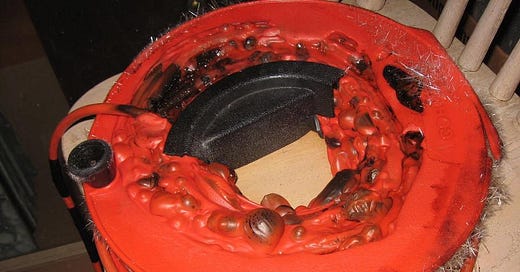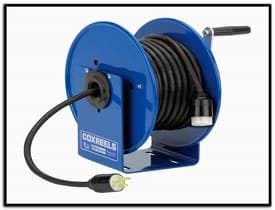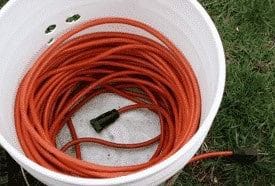Hey Mike,
I was thinking about getting a bucket to store my shore power extension cord, or maybe even one of those fancy reels. But my neighbor who’s an electrician told me that the coil of wire will create some sort of induction heating effect and the wire will get hot. He recommends that I pull the entire extension cord out of the bucket and lay it all flat on the ground. Is that true? If so, what’s the theory behind this phenomenon? —Nick
Hi Nick,
Thanks for writing. Boy, this is a golden oldie that just won’t go away. Below are two pictures of what you’re talking about. A fancy cord reel can cost up to a few hundred bucks but looks very professional, while the cheap cord in a bucket only costs $5 and looks a little less professional but still gets the job done.
As a pro sound engineer I often have to contend with really large and long power cables, as big as 2/0 or 4/0 gauge, which can carry 200 to 400 amperes of current. And we were always told by management that it all had to be uncoiled out of its road case and laid on the ground or induction heating would melt the wires.
So after a few gigs of unwrapping and rewrapping hundreds of pounds of 2/0 feeder cable I did some calculations and found that any induction from the coil of wire was so low as to be nearly unmeasurable, and any heating effects from induction would be below the level of my instrument noise and calibration. In short, if there were any heating effects going on, it wasn’t due to induction from the wire in a coil. Plus, a standard extension cord has both neutral and live conductors in parallel. Since the currents are running in opposite directions, that cancels out any magnetic field, essentially nulling out any inductive effects.
But will it get hot from something else?
However, I did discover that an extension cord placed in a box without ventilation would indeed heat up a little, and it didn’t matter if the cord was coiled or loosely folded to reduce any induction eddy effects. So it really seemed like a lack of any air ventilation around the power cords was concentrating the normal heating due to regular voltage drops into a small space. But even that heating was negligible under reasonable power draw on the cable.
However, if you did use the cable up near its amperage limit while in a tightly closed box, it could heat up to the point of becoming a fire hazard. Again, this has nothing to do with induction heating from eddy currents. It’s due to a few hundred watts of heating from normal voltage drop over the length of an extension cord concentrated into a very small box without any air ventilation.
Conclusions…
So what does this mean to you? Well, if you plan on having 90 feet of an undersized extension cord jammed into a small, unventilated space in your RV, then it can be a fire hazard.
However, any exterior amount of an extension cord reel or bucket with a few air holes should be completely safe. To know for sure, just touch the extension cord periodically while using it under load. It might feel slightly warm to the touch and that’s OK.
However, if it feels like a toaster oven then you’re doing something terribly wrong and you need to shut it off and disconnect immediately. And never use too small of an extension cord for your shore power connection. You’ve seen many of my charts here already, so I won’t bore you with gauge sizes. But a 30-amp RV shore power cord MUST be at least 10-gauge size. Never overload an extension cord or you’ll be sorry.
Let’s play safe out there…. Mike








Mike,
Don't know if you will see this as its an older post. I agree with your math about there not really being any induction heating possible. Over on the FB group RVElectricity there is a current post about some park that burnt up because they think someone misused a 50->20 (or similar) type adapter and melted a cord.
One of the side topics that came up, as always, is to never leave your cord coiled up, it will get hot. There are several "movie set electricians" who say you need to roil your cords up in a figure 8, that will avoided any heating. Since you do sound work I figure you must have heard or seen this theory. I don't see how a figure 8 (or square or trapezoid,...) could be any better that a circle rolling up cable. Especially since we just said/proved that induction is not an issue.
Mike,
I have a cord reel for my 50A "standard" power cord (I think 6-6-6-8?). The cord is 35 ft, and the instructions call for it to always be fully unwound before use. I have not noticed any cord heating when unwound. I often don't need the full length. Would it be reasonable to try using it while still on the cord reel as long as I keep an eye on the temperature?